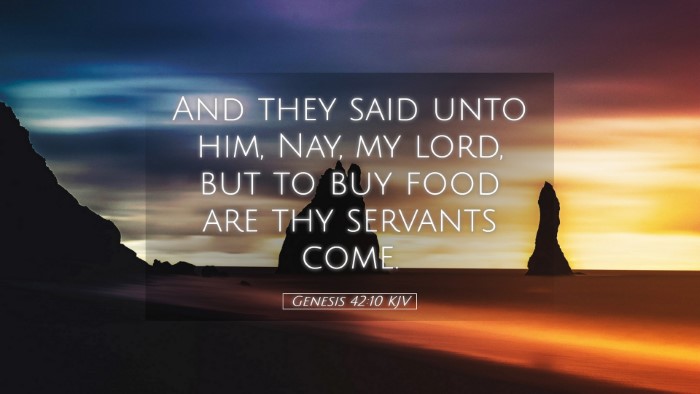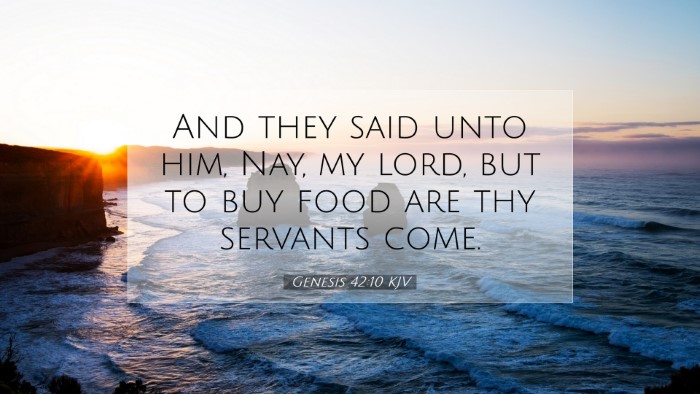Commentary on Genesis 42:10
Verse: Genesis 42:10 - "And they said to him, No, my lord; but your servants have come to buy food."
Context Overview
The narrative of Genesis 42 unfolds amidst the broader story of Joseph, who, having been sold into slavery by his brothers, rises to power in Egypt. By this time, a famine had struck the land, compelling Jacob (Israel) to send his sons to Egypt in search of sustenance. The verse marks an important moment in the interaction between Joseph and his brothers, who do not recognize him.
Theological Significance
This interaction is rich with theological implications, particularly concerning themes of reconciliation, guilt, and providence.
- Reconciliation: The brothers' arrival in Egypt symbolizes a potential turning point in their relationship with Joseph. They stand before the very brother they wronged, which raises questions about their repentance and moral state.
- Guilt and Recognition: Their denial ("No, my lord") shows a mix of fear and avoidance regarding their past sins. This moment illustrates their internal conflict and the ongoing impact of their betrayal on their conscience.
- Divine Providence: Joseph's authority in Egypt, despite their betrayal, reflects God's overarching plan. This chapter underlines the belief that God can weave together human actions for His purpose, even when those actions are evil in intention.
Insights from Public Domain Commentaries
Matthew Henry
Henry emphasizes the significance of Joseph's wisdom and position. As the brothers face Joseph, they are unwittingly fulfilling God’s plan. Henry notes that Joseph acts with foresight, as he embodies the very providence of God in preparing for the coming famine. The piety and humility exhibited by the brothers—coming to buy food—illustrates their dependence on God’s provision, even while they wrestle with their past.
Albert Barnes
Barnes provides a detailed examination of the implications of the brothers’ assertion of their intentions. He highlights the role of guilt in their dialogue and the palpable tension between their recognition of need and their moral history. Barnes remarks on how their admission of servitude—"your servants"—underscores a hitherto unseen recognition of their past actions and their present vulnerability. He posits that this dynamic can serve as a reflection on repentance, and how acknowledging one’s position before God is crucial in spiritual restoration.
Adam Clarke
Clarke's commentary focuses on the psychological aspects of the brothers' dialogue. He notes their fearful avoidance of confronting their sin directly, which points to the universality of human struggle with guilt. Clarke also elaborates on the ramifications of their famine-driven journey, representing a broader existential need for sustenance—both physical and spiritual. He urges that their admission of being "servants" signifies not only their present state but also highlights the restoration that is possible through humility and contrition.
Practical Applications
This passage presents a wealth of pastoral and theological applications:
- Encouragement in Guilt: For those who struggle with past sins, the text illustrates that acknowledgment is the first step toward healing and reconciliation.
- God’s Sovereignty: The narrative encourages believers to trust in God’s providence amidst difficult circumstances, reaffirming that God can bring good from evil situations.
- Humility in Service: The brothers' willingness to refer to themselves as servants can serve as a model for believers—redirecting focus from pride to humility and service in the broader community.
Conclusion
Genesis 42:10 serves as a pivotal moment in the narrative, encapsulating themes of sin, remorse, and divine purpose. As Joseph's brothers stand before him, they are forced to confront their past while recognizing their current needs. For pastors, theologians, and students of Scripture, this verse invites deep reflection on the nature of reconciliation, the weight of guilt, and the profound ways God works through the lives of His people. In embracing both their past and present, believers are encouraged to seek God's mercy and sustenance, affirming the truth that He can transform sorrow into redemption.


